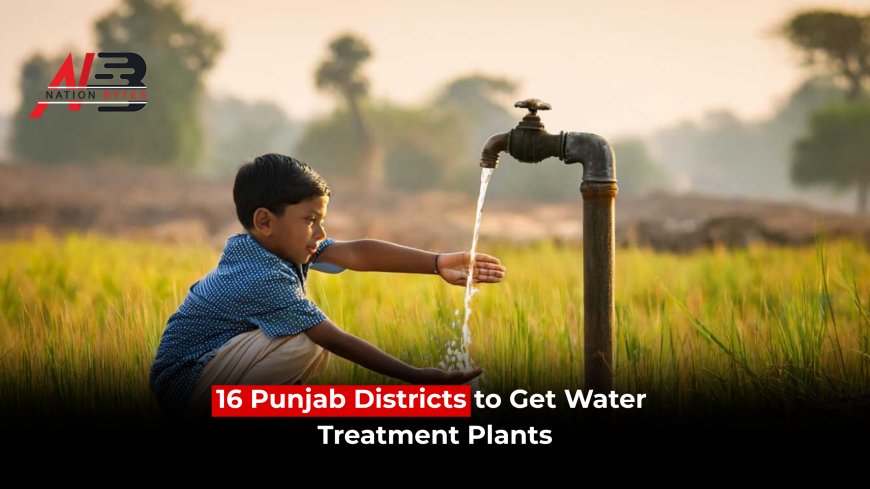Punjab Launches Clean Water Project in 16 Districts
The Punjab government has launched a major clean drinking water initiative. In its first phase, water filtration and treatment plants will be set up in 16 districts, benefiting 29 million citizens by 2026.

The Punjab government has announced an ambitious plan to ensure access to clean and safe drinking water for millions of people across the province. In the first phase of the Punjab Saaf Pani Project, water filtration and treatment plants will be established in 16 districts, aiming to tackle the growing issue of arsenic-contaminated groundwater and provide relief to urban and rural communities alike.
The project, led by the Punjab Saaf Pani Authority (PSPA), reflects the provincial government’s commitment to improving public health, reducing water-borne diseases, and strengthening water infrastructure in Punjab.
Filtration and Treatment Plants Planned
During a recent high-level meeting chaired by Housing Secretary Noorul Amin Mengal, PSPA CEO Naveed Ahmad briefed officials on the project’s implementation plan.
According to the Housing Department spokesperson, specialized water filtration plants will be installed in areas where groundwater has been declared unsafe due to high levels of arsenic, fluoride, and other harmful contaminants.
In addition to these treatment facilities, the government will establish four large-scale bottling plants in Khushab, Bahawalpur, Dera Ghazi Khan, and Rahim Yar Khan. These plants will supply 19-litre bottles of purified drinking water to citizens at affordable rates a move designed to reduce reliance on unsafe private water sources and unregulated bottling units.
First Phase to Benefit 29 Million Citizens by 2026
According to the Housing Department, the first phase of the project is expected to be completed by June 30, 2026, directly benefiting around 29 million people across Punjab.
The provincial cabinet has already given its approval for the operations and management framework, allowing the project to move into the execution stage. Once operational, the initiative will significantly enhance access to clean drinking water in both urban and rural communities.
Smart Monitoring Through SCADA System
To ensure transparency and efficiency, the Punjab government will deploy a Supervisory Control and Data Acquisition (SCADA) system a digital monitoring network that allows officials to track the real-time performance of each filtration and treatment plant.
Through this advanced system, the government aims to prevent water theft, identify faults quickly, and guarantee consistent supply.
Filtration plants will be installed not only in public areas but also in schools, government offices, mosques, seminaries, and police stations, ensuring every sector of society benefits from the clean water initiative.
A Step Toward Sustainable Water Management
Punjab has faced a growing water crisis due to rapid urbanization, industrial pollution, and declining groundwater levels. Experts have long warned that arsenic contamination in groundwater poses serious health risks, including cancer and cardiovascular diseases.
By launching this project, the government seeks to address these issues head-on through sustainable water management practices.
The PSPA plans to maintain strict quality control standards, ensuring that all filtration units comply with World Health Organization (WHO) water safety guidelines.
The use of modern treatment technologies, such as reverse osmosis (RO) systems and UV purification, will ensure the water meets both local and international standards.
Economic and Social Benefits
Beyond public health, the clean water project is expected to create hundreds of new jobs, especially for engineers, technicians, and maintenance staff.
It will also support local industries, as the construction of bottling and filtration plants will generate demand for machinery, building materials, and logistics services.
In rural areas, access to clean drinking water will reduce the burden on women and children, who often travel long distances to fetch water. This will help improve school attendance, community well-being, and productivity.
Government’s Commitment to Public Welfare
Speaking about the initiative, Housing Secretary Noorul Amin Mengal emphasized that clean drinking water is not a privilege but a basic human right.
He added that the Punjab government, under the leadership of Chief Minister Maryam Nawaz Sharif, is determined to provide sustainable water access to every household in the province.
“The clean water initiative is part of our broader vision for a healthy, green, and prosperous Punjab,” Mengal said. “This project will not only improve public health but also promote environmental sustainability and social welfare.”
Future Outlook
If implemented effectively, the Punjab Saaf Pani Project could become a model for other provinces in Pakistan.
With advanced monitoring, transparent management, and community participation, it has the potential to transform the way Pakistan manages its water resources.
By 2026, millions of families are expected to benefit from safe drinking water, marking a major milestone in Punjab’s journey toward a healthier and more sustainable future.
For more updates visit: Nation bytes

 Ateeq Ur Rehman
Ateeq Ur Rehman